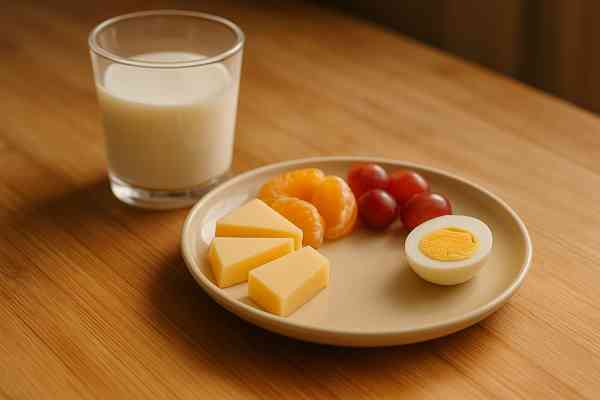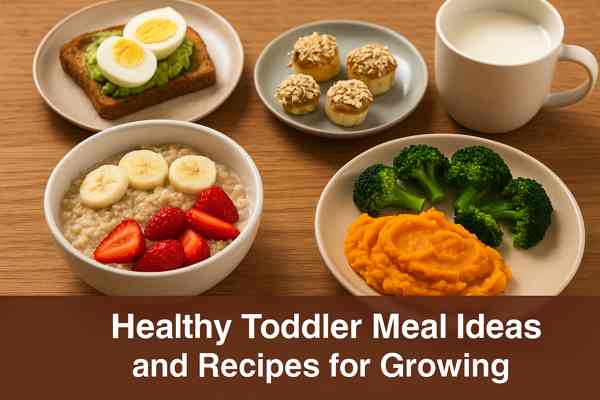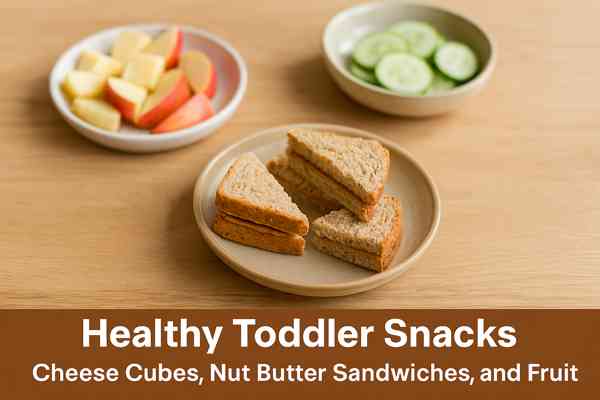Toddler Food: Healthy Meal Ideas, Finger Foods & Easy Recipes
Feeding your toddler can be both fun and challenging. These early years are the foundation for lifelong healthy eating habits, so choosing the right toddler food matters. From peanut butter sandwiches to sweet potato bites, there are many delicious and nutritious ways to nourish your little one. This guide covers easy toddler recipes, practical meal ideas, and expert advice to make every meal healthy, balanced, and enjoyable for your child.
Why Nutrition Matters for Toddlers
![]()
Toddlers grow fast, and their energy needs are high. A well-balanced diet gives your little ones the vitamins, minerals, and energy they need to explore the world. A good toddler meal should include protein, healthy fats, carbohydrates, and plenty of fruits and vegetables. Combining whole milk, cheese, eggs, fruits, and grains helps your baby develop strong bones and a healthy mind.

Understanding Toddler Eating Behavior
![]()
Every toddler develops a unique relationship with food. Between 12 and 36 months, growth slows down, and appetite often decreases. This is perfectly normal, though it sometimes worries parents. Your child may love one meal today and reject it tomorrow — that’s part of the learning process. The key is patience and consistency.
Toddlers explore through touch, smell, and taste, so mealtimes can be messy. Let your little one play with foods safely — it helps them accept new textures and flavors. If your baby refuses vegetables or new recipes, keep offering them in small portions without pressure. Over time, healthy eating habits will form naturally when children see their family enjoying balanced meals together.

Healthy Toddler Meal Ideas
![]()
Planning meals for toddlers doesn’t have to be complicated. Below are easy meal ideas and toddler recipes you can rotate through the week:
- Breakfast: Oatmeal topped with fruit and a spoonful of nut butter or peanut butter for extra protein.
- Lunch: Mini boiled egg sandwiches with avocado and whole-grain toast.
- Dinner: Mashed sweet potato with shredded cheese and steamed veggies.
- Snacks: Soft finger foods like banana slices, whole-grain crackers with cheese, or yogurt with berries.

Balanced Nutrition for Toddlers: What to Include Daily
![]()
A balanced toddler meal plan gives your child all the energy and nutrients needed for healthy growth. Each day, try to include foods from every group: protein, grains, fruits, vegetables, and dairy. A variety of colors on the plate usually means a variety of nutrients too.
Whole milk and cheese provide calcium for strong bones, while boiled eggs, beans, and lean meats are excellent protein sources. Don’t forget healthy fats from nut butter or avocados — these support brain development. Add soft vegetables like sweet potato or carrots for vitamins, and offer fresh fruit for natural sweetness. Including whole grains, such as brown rice or oats, keeps your toddler full and energized between meals.
Keeping portions small and offering a mix of textures helps your baby enjoy a variety of foods. If your little one skips a meal, don’t stress — their appetite often changes daily. Focus on balance over the week, not perfection every day.
Easy Toddler Recipes for Busy Families
![]()
Here are a few easy recipes that your family will love:
- Peanut Butter Banana Bites: Spread peanut butter on banana slices, top with oats, and freeze for a healthy snack.
- Sweet Potato Mash: Mix mashed sweet potato with a little whole milk and cinnamon for a smooth, creamy toddler meal.
- Mini Egg Muffins: Combine boiled egg pieces, chopped veggies, and cheese in muffin cups—perfect for finger foods on busy mornings.
- Fruit and Cheese Skewers: Alternate cubes of cheese and soft fruit for a fun, colorful snack.

Creating Balanced Meals for Toddlers
![]()
Every toddler benefits from a variety of foods. Make sure each meal includes:
- Protein: Nut butter, boiled egg, or tender chicken pieces.
- Dairy: Whole milk or cheese for calcium and vitamin D.
- Fruits and Vegetables: Colorful foods like sweet potato, carrots, or berries.
- Whole Grains: Oatmeal, brown rice, or whole-grain pasta.
Tips for Feeding Toddlers
![]()
- Offer small portions to match their appetite.
- Encourage self-feeding with safe finger foods.
- Be patient—toddlers often need to try a food several times before liking it.
- Include your child in simple meal prep to spark curiosity.
- Keep meals fun and colorful—presentation matters!
Snack Ideas for Toddlers
![]()
Healthy snack options keep children full of energy between meals. Here’s a quick list of great toddler snacks:
- Soft fruit slices like pears, peaches, or bananas.
- Plain yogurt with a drizzle of nut butter.
- Cheese sticks and whole-grain crackers.
- Mini sandwiches with peanut butter or mashed sweet potato.
- Boiled egg halves sprinkled with a little salt.

Family Mealtime and Healthy Habits
![]()
Sharing meals as a family helps toddlers learn by watching others. Sit together, turn off screens, and enjoy food in a calm, happy atmosphere. Encourage your child to try new foods but never force it—trust their hunger cues. Over time, your little one will grow into a confident, curious eater who loves healthy foods.
Common Questions About Toddler Meals and Snacks
![]()
How much milk does my toddler need each day?
Most toddlers need about 2 to 3 cups of whole milk daily. Milk supports bone health and provides vitamin D, but too much can make your child feel full and reduce appetite for other foods. Balance it with fruit, grains, and protein from cheese or eggs for a healthy meal.
Are peanut butter and nut butter safe for toddlers?
Yes — smooth peanut butter and other nut butters can be part of a healthy toddler food plan if your baby shows no allergy signs. Spread thin layers on toast, mix into oatmeal, or serve with soft fruit slices. Avoid chunky versions that could pose a choking risk for little ones.
What are the best finger foods for toddlers?
Soft, bite-sized finger foods encourage independence and are fun to eat. Try cooked sweet potato cubes, boiled egg pieces, small bits of cheese, or fruit slices. These easy meal ideas keep children engaged and introduce new textures at every meal.

Conclusion: Helping Your Toddler Build a Love for Healthy Food
![]()
Raising a healthy eater starts with consistency, patience, and positive experiences with food. When you prepare colorful meals that include whole milk, sweet potato, fruit, and protein-rich options like cheese or boiled eggs, your child learns to enjoy balanced eating. Encourage your toddler to explore new recipes and textures — even a small bite is a victory.
Family meals help your little one understand that eating together is about connection, not perfection. Serve healthy foods, model good habits, and let your baby decide how much to eat. Offering simple finger foods and snacks makes mealtime more enjoyable for everyone. Over time, your toddler will grow into a confident, curious eater who sees meal times as a positive family moment.
Remember, there’s no perfect recipe for parenting or nutrition. Focus on progress, variety, and joy at the table. Every small step — from introducing nut butter toast to celebrating a new toddler meal — helps your little ones develop lifelong healthy food habits that will benefit the whole family.





